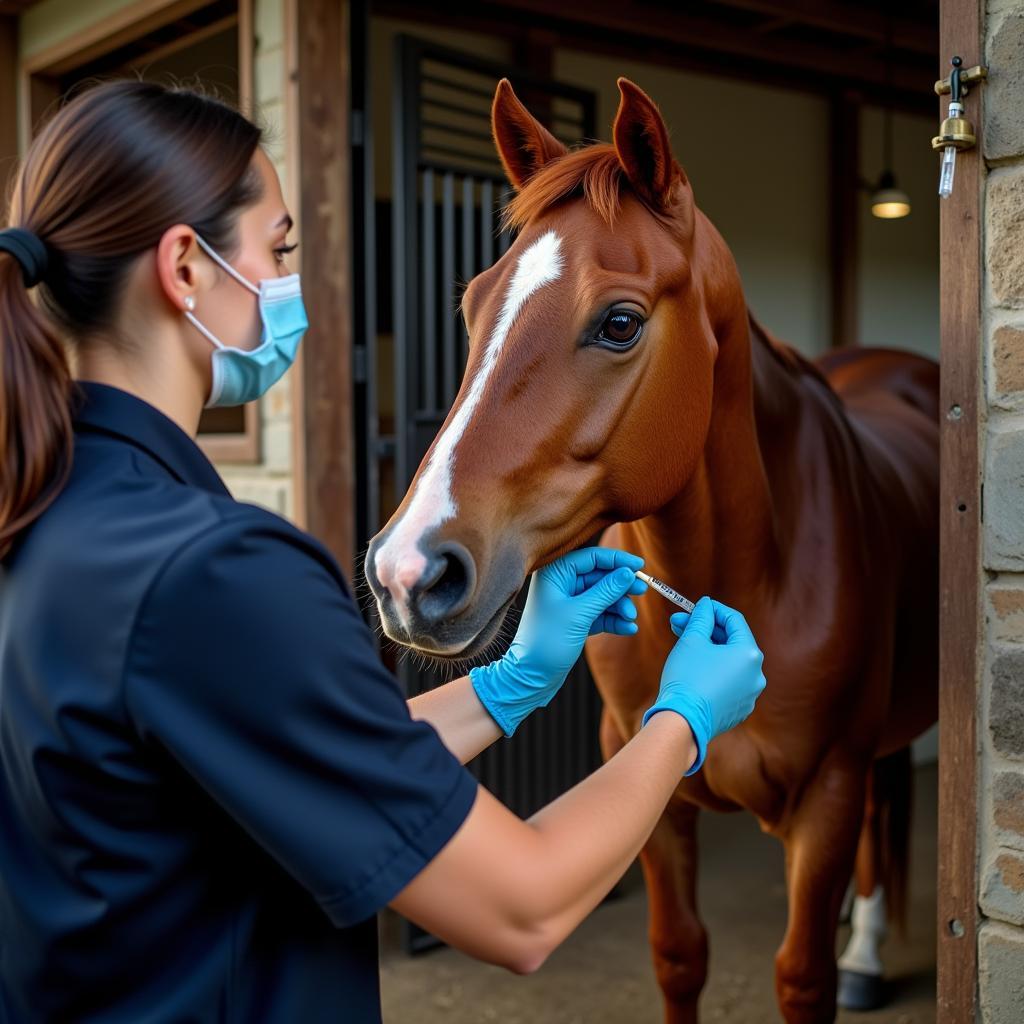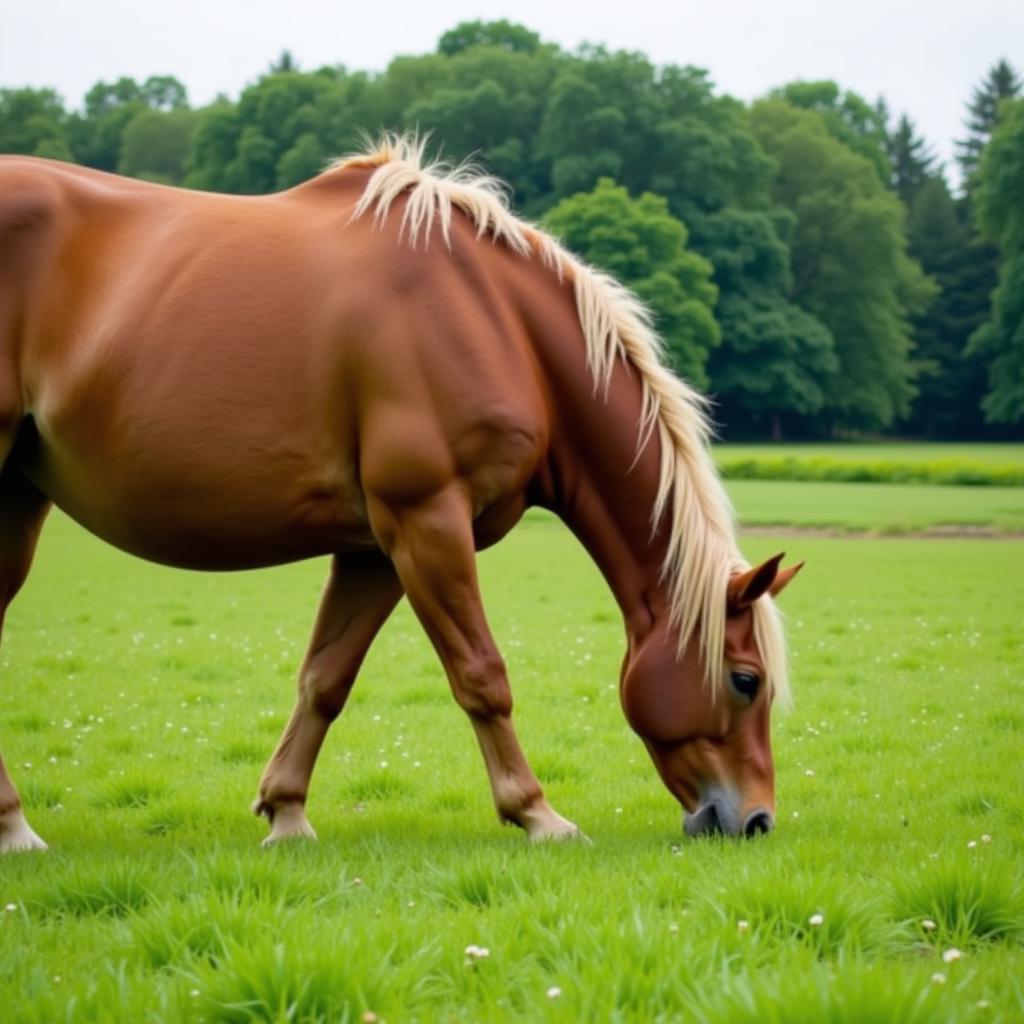As a horse owner, you want to do everything you can to keep your equine companion healthy and thriving. Just like their human counterparts, horses need regular vaccinations to protect them from a variety of potentially serious diseases. But navigating the world of equine vaccines can feel overwhelming. What shots do horses really need? This comprehensive guide will walk you through the essential vaccines, recommended schedules, and answer frequently asked questions about horse vaccinations.
 Horse Receiving Vaccination
Horse Receiving Vaccination
Understanding Equine Vaccination
Horses are susceptible to a range of diseases caused by viruses and bacteria, some of which can be fatal. Vaccines work by introducing a harmless version of the disease-causing agent into your horse’s system. This triggers an immune response, preparing the body to fight off the actual disease if it encounters it in the future.
Core vs. Risk-Based Vaccines: What’s the Difference?
Equine vaccines are generally classified as either “core” or “risk-based.”
Core vaccines are considered essential for almost all horses, regardless of their lifestyle or location. These vaccines protect against diseases that are:
- Common
- Potentially fatal
- Highly contagious
Risk-based vaccines are recommended based on your horse’s individual risk factors, such as:
- Geographic location
- Age
- Breed
- Exposure to other horses
- Travel frequency
Your veterinarian can help you determine which risk-based vaccines are appropriate for your horse.
Essential Core Vaccines for Horses
While the specific core vaccines recommended may vary slightly depending on your location, the following are generally considered essential for most horses:
1. Tetanus
What it is: Tetanus is a serious bacterial infection that affects the nervous system. It’s often fatal in horses.
Why it’s important: Tetanus bacteria are found in soil and manure, making it virtually impossible to completely eliminate exposure.
Vaccination schedule: Initial vaccination followed by boosters every 1-3 years.
2. Eastern and Western Equine Encephalomyelitis (EEE/WEE)
What it is: EEE and WEE are viral diseases spread by mosquitoes that cause inflammation of the brain and spinal cord.
Why it’s important: These diseases are often fatal, with few treatment options available.
Vaccination schedule: Annual vaccination, typically in the spring or early summer.
 Horse Grazing Peacefully in a Pasture
Horse Grazing Peacefully in a Pasture
3. West Nile Virus
What it is: West Nile virus is another mosquito-borne illness that can cause neurological disease in horses.
Why it’s important: While not all infected horses show symptoms, those that do can experience fever, stumbling, and even paralysis.
Vaccination schedule: Annual vaccination, often combined with EEE/WEE vaccines.
4. Rabies
What it is: Rabies is a deadly viral disease that attacks the nervous system and can be transmitted to humans.
Why it’s important: While rabies cases in horses are relatively rare, it’s a serious public health concern.
Vaccination schedule: Initial vaccination followed by boosters every 1-3 years.
5. The 5-Way and 7-Way Vaccines
The 5-way and 7-way vaccines are combination vaccines that protect against multiple diseases.
- The 5-way vaccine typically includes protection against tetanus, EEE, WEE, West Nile virus, and equine influenza.
- The 7-way vaccine includes the same protections as the 5-way, plus equine rhinopneumonitis (equine herpesvirus types 1 and 4).
engagement pictures with horses
You can learn more about these important vaccines in our dedicated articles: 5 way vaccine horse and 7 way vaccine for horses.
Common Risk-Based Vaccines for Horses
In addition to core vaccines, several risk-based vaccines are available depending on your horse’s specific needs. Some common examples include:
-
Equine Influenza: This highly contagious respiratory virus is a significant concern for horses that travel frequently or are exposed to large groups of horses at shows or events.
-
Equine Herpesvirus (EHV): EHV can cause respiratory disease, abortion, and neurological problems in horses. Vaccination is often recommended for pregnant mares, foals, and horses that travel or compete regularly.
-
Strangles: Strangles is a highly contagious bacterial infection that causes fever, nasal discharge, and swollen lymph nodes. Vaccination may be recommended for young horses, horses in close contact with other horses, or horses in areas with a high prevalence of strangles.
-
Potomac Horse Fever: This disease is caused by a bacterium found in aquatic insects and can lead to fever, diarrhea, and laminitis. Vaccination is often recommended for horses living in or traveling to areas where the disease is common.
Creating a Vaccination Schedule for Your Horse
The best vaccination schedule for your horse will depend on their age, health status, and risk factors. Work closely with your veterinarian to develop a customized plan.
Here’s a general guideline for horse vaccination schedules:
- Foals: Foals receive initial vaccinations starting at around 4-6 months of age, followed by booster shots.
- Adult Horses: Adult horses typically receive annual boosters for core vaccines and risk-based vaccines as needed.
- Pregnant Mares: Pregnant mares may require additional vaccinations to protect their foals from diseases like EHV.
Expert Insight: “Remember, every horse is an individual. There’s no one-size-fits-all approach to equine vaccination,” says Dr. Emily Carter, DVM, an equine veterinarian with over 15 years of experience. “Work with your veterinarian to develop a customized vaccination plan tailored to your horse’s unique needs and risk factors.”
Frequently Asked Questions About Horse Vaccinations
1. Are horse vaccines safe?
Horse vaccines are generally very safe. Like any medication, side effects can occur, but they are typically mild and short-lived. The most common side effects include soreness at the injection site, mild fever, and decreased appetite.
2. Can I vaccinate my horse myself?
While it’s technically possible to administer some vaccines yourself, it’s generally recommended to have a veterinarian vaccinate your horse. Veterinarians are trained to handle and administer vaccines safely and can also ensure the vaccine is stored and handled correctly.
3. What happens if my horse misses a booster shot?
If your horse misses a booster shot, don’t panic. Contact your veterinarian to discuss the best course of action. In many cases, your horse will simply need to be revaccinated.
4. Can my horse still get a disease even if they are vaccinated?
While vaccines significantly reduce the risk of disease, they don’t offer 100% protection. However, if a vaccinated horse does contract a disease, they will likely experience a much milder form of the illness.
5. How much do horse vaccines cost?
The cost of horse vaccines varies depending on the specific vaccine, your location, and your veterinarian’s fees. On average, you can expect to pay between $25 and $100 per vaccine.
Conclusion: Protecting Your Equine Partner Through Vaccination
Vaccinations are a cornerstone of responsible horse ownership, providing vital protection against potentially devastating diseases. By understanding the core vaccines, assessing your horse’s individual risk factors, and working closely with your veterinarian, you can develop a comprehensive vaccination strategy to safeguard your equine companion’s health and well-being for years to come.
Remember, proactive healthcare, including regular vaccinations, is always better than reactive treatment. Keep those shots up-to-date, and enjoy many happy and healthy years with your horse.
Need Help Creating a Vaccination Plan for Your Horse?
Contact Justus Horses USA today! Our team of experts can answer your questions, provide personalized guidance, and help you navigate the complexities of equine healthcare.
Call us at: 0772127271
Email us at: [email protected]
Visit us at: QGM2+WX2, Vị Trung, Vị Thuỷ, Hậu Giang, Việt Nam.
We’re here to support you and your horse 24/7.